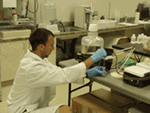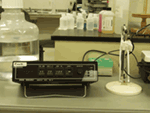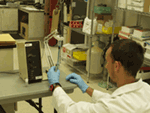More than two years after road access and electrical power to the Mauna Loa Observatory was cut off by lava flows, NOAA staff continue to make critical measurements of the atmosphere and other environmental variables at the remote site.
In 2023, observatory staff installed solar panels at the site and resumed some measurements, including the independent carbon dioxide monitoring programs run by the Global Monitoring Laboratory and Scripps Institution of Oceanography, as well as other atmospheric measurements.
Construction of a temporary road to access the observatory site is anticipated to begin in summer 2025.
Media can contact: Theo Stein (303) 819-7409 (theo.stein@noaa.gov)
Organization(s):
 National Oceanic and
Atmospheric Administration (NOAA),
National Oceanic and
Atmospheric Administration (NOAA),
Earth System Research Laboratory (ESRL)
What does this program measure?
This program measures the pH, conductivity, anions and cations of local precipitation.
How does this program work?
Rain is collected continuously in a precipitation collector. When a sensor on the collector detects rain, the cover opens and rain collects in a bucket. Every week the bucket is changed and the sample is taken to the MLO office in Hilo where the precipitation is analyzed in a chemistry laboratory. A ph Meter is used to measure pH, a conductivity bridge is used to measure conductivity, and an ion chromatograph is used to measure anions and cations.
Why is this research important?
This research follows up previous rain studies at Mauna Loa, extending the length of precipitation chemistry programs here.
Are there any trends in the data?
This data follows established trends in that the values remain close to carbonic acid values for this island.
How does this program fit into the big picture?
What is it's role in global climate change?
Again, this program follows the trends of old acid rain programs such as the NADP (National Atmospheric Deposition Program)
Comments and References
The NADP began this program. See also the EPA Mercury Precipitation program at Mauna Loa.
Lead Investigator(s):
Aidan Colton
808-933-6965 (x233)
MLO Contact(s):
MLO
808-933-6965
Web Site(s)
not available
Date Started
1971



